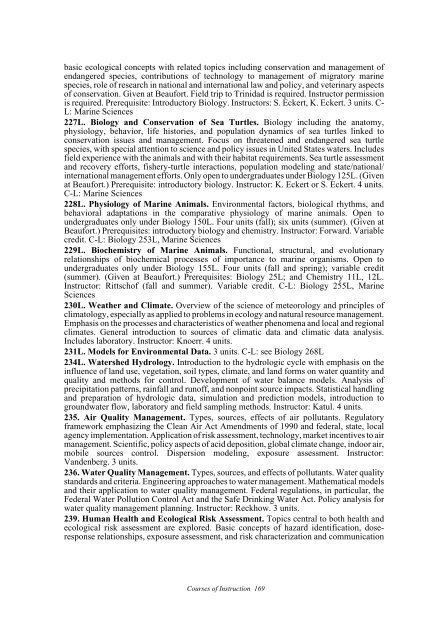Duke University 2008-2009 - Office of the Registrar - Duke University
Duke University 2008-2009 - Office of the Registrar - Duke University
Duke University 2008-2009 - Office of the Registrar - Duke University
Create successful ePaper yourself
Turn your PDF publications into a flip-book with our unique Google optimized e-Paper software.
asic ecological concepts with related topics including conservation and management <strong>of</strong><br />
endangered species, contributions <strong>of</strong> technology to management <strong>of</strong> migratory marine<br />
species, role <strong>of</strong> research in national and international law and policy, and veterinary aspects<br />
<strong>of</strong> conservation. Given at Beaufort. Field trip to Trinidad is required. Instructor permission<br />
is required. Prerequisite: Introductory Biology. Instructors: S. Eckert, K. Eckert. 3 units. C-<br />
L: Marine Sciences<br />
227L. Biology and Conservation <strong>of</strong> Sea Turtles. Biology including <strong>the</strong> anatomy,<br />
physiology, behavior, life histories, and population dynamics <strong>of</strong> sea turtles linked to<br />
conservation issues and management. Focus on threatened and endangered sea turtle<br />
species, with special attention to science and policy issues in United States waters. Includes<br />
field experience with <strong>the</strong> animals and with <strong>the</strong>ir habitat requirements. Sea turtle assessment<br />
and recovery efforts, fishery-turtle interactions, population modeling and state/national/<br />
international management efforts. Only open to undergraduates under Biology 125L. (Given<br />
at Beaufort.) Prerequisite: introductory biology. Instructor: K. Eckert or S. Eckert. 4 units.<br />
C-L: Marine Sciences<br />
228L. Physiology <strong>of</strong> Marine Animals. Environmental factors, biological rhythms, and<br />
behavioral adaptations in <strong>the</strong> comparative physiology <strong>of</strong> marine animals. Open to<br />
undergraduates only under Biology 150L. Four units (fall); six units (summer). (Given at<br />
Beaufort.) Prerequisites: introductory biology and chemistry. Instructor: Forward. Variable<br />
credit. C-L: Biology 253L, Marine Sciences<br />
229L. Biochemistry <strong>of</strong> Marine Animals. Functional, structural, and evolutionary<br />
relationships <strong>of</strong> biochemical processes <strong>of</strong> importance to marine organisms. Open to<br />
undergraduates only under Biology 155L. Four units (fall and spring); variable credit<br />
(summer). (Given at Beaufort.) Prerequisites: Biology 25L; and Chemistry 11L, 12L.<br />
Instructor: Rittsch<strong>of</strong> (fall and summer). Variable credit. C-L: Biology 255L, Marine<br />
Sciences<br />
230L. Wea<strong>the</strong>r and Climate. Overview <strong>of</strong> <strong>the</strong> science <strong>of</strong> meteorology and principles <strong>of</strong><br />
climatology, especially as applied to problems in ecology and natural resource management.<br />
Emphasis on <strong>the</strong> processes and characteristics <strong>of</strong> wea<strong>the</strong>r phenomena and local and regional<br />
climates. General introduction to sources <strong>of</strong> climatic data and climatic data analysis.<br />
Includes laboratory. Instructor: Knoerr. 4 units.<br />
231L. Models for Environmental Data. 3 units. C-L: see Biology 268L<br />
234L. Watershed Hydrology. Introduction to <strong>the</strong> hydrologic cycle with emphasis on <strong>the</strong><br />
influence <strong>of</strong> land use, vegetation, soil types, climate, and land forms on water quantity and<br />
quality and methods for control. Development <strong>of</strong> water balance models. Analysis <strong>of</strong><br />
precipitation patterns, rainfall and run<strong>of</strong>f, and nonpoint source impacts. Statistical handling<br />
and preparation <strong>of</strong> hydrologic data, simulation and prediction models, introduction to<br />
groundwater flow, laboratory and field sampling methods. Instructor: Katul. 4 units.<br />
235. Air Quality Management. Types, sources, effects <strong>of</strong> air pollutants. Regulatory<br />
framework emphasizing <strong>the</strong> Clean Air Act Amendments <strong>of</strong> 1990 and federal, state, local<br />
agency implementation. Application <strong>of</strong> risk assessment, technology, market incentives to air<br />
management. Scientific, policy aspects <strong>of</strong> acid deposition, global climate change, indoor air,<br />
mobile sources control. Dispersion modeling, exposure assessment. Instructor:<br />
Vandenberg. 3 units.<br />
236. Water Quality Management. Types, sources, and effects <strong>of</strong> pollutants. Water quality<br />
standards and criteria. Engineering approaches to water management. Ma<strong>the</strong>matical models<br />
and <strong>the</strong>ir application to water quality management. Federal regulations, in particular, <strong>the</strong><br />
Federal Water Pollution Control Act and <strong>the</strong> Safe Drinking Water Act. Policy analysis for<br />
water quality management planning. Instructor: Reckhow. 3 units.<br />
239. Human Health and Ecological Risk Assessment. Topics central to both health and<br />
ecological risk assessment are explored. Basic concepts <strong>of</strong> hazard identification, doseresponse<br />
relationships, exposure assessment, and risk characterization and communication<br />
Courses <strong>of</strong> Instruction 169









